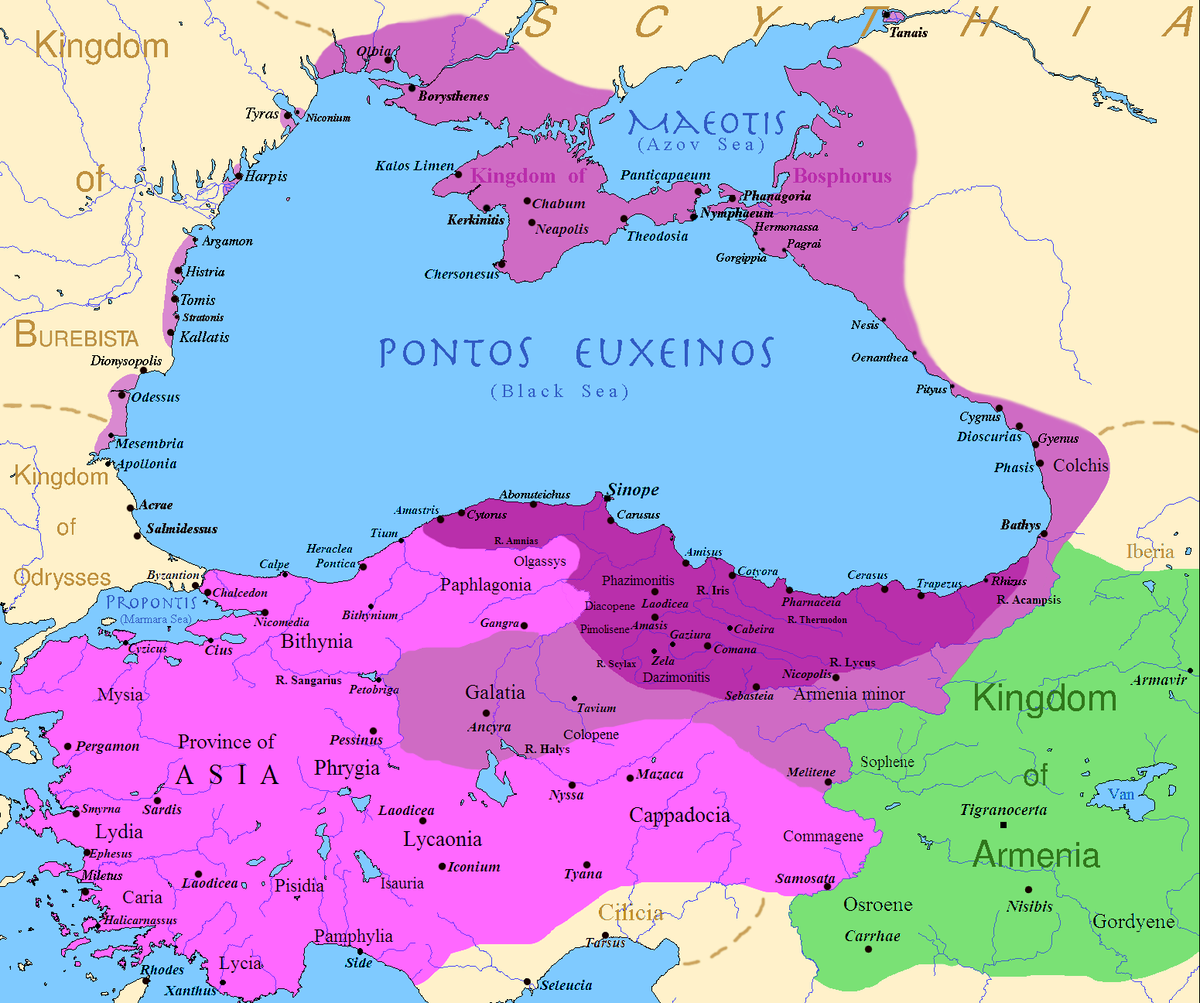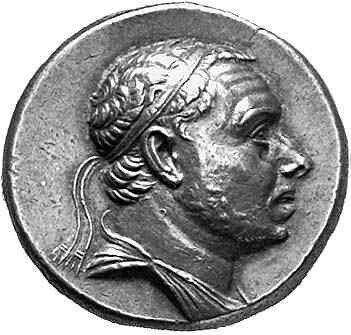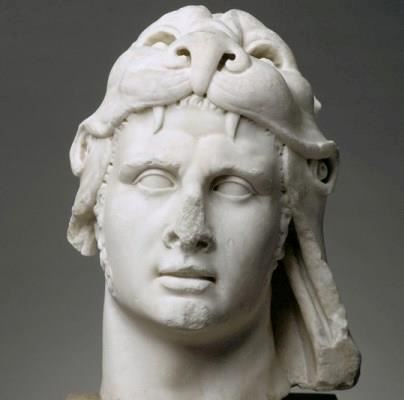The Kingdom of Pontus or Pontic Empire was a state founded by the Persian Mithridatic dynasty, which may have been directly related to Darius the Great and the Achaemenid dynasty.
The kingdom was proclaimed by Mithridates I in 281 BCE and lasted until its conquest by the Roman Republic in 63 BCE. It reached its largest extent under Mithridates VI the Great, who conquered Colchis, Cappadocia, Bithynia, the Greek colonies of the Tauric Chersonesos, and for a brief time the Roman province of Asia.
After a long struggle with Rome in the Mithridatic Wars, Pontus was defeated; part of it was incorporated into the Roman Republic as the province Bithynia et Pontus, and the eastern half survived as a client kingdom.
The kingdom was proclaimed by Mithridates I in 281 BCE and lasted until its conquest by the Roman Republic in 63 BCE. It reached its largest extent under Mithridates VI the Great, who conquered Colchis, Cappadocia, Bithynia, the Greek colonies of the Tauric Chersonesos, and for a brief time the Roman province of Asia.
After a long struggle with Rome in the Mithridatic Wars, Pontus was defeated; part of it was incorporated into the Roman Republic as the province Bithynia et Pontus, and the eastern half survived as a client kingdom.

Mithradate I was a Persian nobleman and the founder of the Kingdom of Pontus in Anatolia. He is said to have been of the same age as Demetrios Poliorketes, which means he was born in the mid-330s BCE.
In 302 or 301 BC, shortly after having executed Mithradates' father, Antigonus Monophthalmus became suspicious of the son who had inherited the family dominion of Cius, and planned to ki...
In 302 or 301 BC, shortly after having executed Mithradates' father, Antigonus Monophthalmus became suspicious of the son who had inherited the family dominion of Cius, and planned to ki...
Ariobarzanes was the second king of Pontus, succeeding his father Mithridates I Ctistes in 266 BC and died in an uncertain date between 258 and 240. He obtained possession of the city of Amastris in Paphlagonia, which was surrendered to him.
Ariobarzanes and his father sought the assistance of the Gauls, who had come into Asia Minor twelve years before the death of Mithridates, to expel...
Ariobarzanes and his father sought the assistance of the Gauls, who had come into Asia Minor twelve years before the death of Mithridates, to expel...
Mithradates II was the third king of Pontus and son of Ariobarzanes, whom he succeeded on the throne. He was a minor when his father died, but the date of his accession cannot be determined. It seems probable that it must have taken place well before 240 BC, as Memnon tells us that he was a child at his father's death, and he had a daughter of marriageable age in 222 BC.
After Mithrada...
After Mithrada...
Mithradates III was the fourth King of Pontus, son of Mithridates II of Pontus and Laodice. Mithridates had two sisters: Laodice III, the first wife of the Seleucid King Antiochus III the Great, and Laodice of Pontus. He may have ruled in an uncertain period between 220 BC and 183 BC. Nothing is known of him since the years just cited, because the kingdom of Pontus disappears from history.
Pharnaces I was the fifth king of Pontus, and the son of King Mithradates III and his wife Laodice, whom he succeeded on the throne. He ruled c. 190 BC – c. 155 BC, but the precise year of his ascension is not known.
In 183 BC he attacked Sinope, after which the Rhodians sent an ambassador to Rome with a complaint but nothing came of it. Soon after he attacked Eumenes II of Pergamon and...
In 183 BC he attacked Sinope, after which the Rhodians sent an ambassador to Rome with a complaint but nothing came of it. Soon after he attacked Eumenes II of Pergamon and...
Mithradates IV was a prince and sixth ruler of the Kingdom of Pontus. He is first mentioned in 179 BC in a treaty concluded by Pharnaces I with Eumenes II of Pergamon, in a manner which suggests that he shared some sovereign power.
The date of his accession to the Pontian throne is unknown, but he is recorded as the ruler of Pontus in 154 BC, when he is mentioned as sending an auxiliary...
The date of his accession to the Pontian throne is unknown, but he is recorded as the ruler of Pontus in 154 BC, when he is mentioned as sending an auxiliary...
Mithradates V was the 7th king of Pontus, ruling from ~150 BC to ~120 BC. He was the son of the King Pharnaces I and Queen Nysa. His mother is believed to have died during childbirth, while giving birth to either him or his sister.
Mithradates V continued the alliance with the Roman Republic started by his predecessors. He supported them with some ships and a small auxiliary force durin...
Mithradates V continued the alliance with the Roman Republic started by his predecessors. He supported them with some ships and a small auxiliary force durin...
Mithradates VI was king of Pontus and Armenia Minor in northern Anatolia from about 120–63 BC. Mithridates is remembered as one of the Roman Republic’s most formidable and successful enemies, who engaged three of the prominent generals from the late Roman Republic in the Mithridatic Wars: Lucius Cornelius Sulla, Lucius Licinius Lucullus and Gnaeus Pompey Magnus. He is often considered the greates...
Darius of Pontus was a client king of Iranian and Greek Macedonian ancestry, ruling Pontus. He was appointed by Marcus Antonius.
Darius' reign must have lasted less that a year because Cassius Dio referred to Polemon as a king of Pontus when he was involved in Mark Antony's war against the Parthians in 36 BC.
Darius' reign must have lasted less that a year because Cassius Dio referred to Polemon as a king of Pontus when he was involved in Mark Antony's war against the Parthians in 36 BC.
Arsaces was the second son and youngest child born to King Pharnaces II of Pontus. In 37 BC his brother Darius died and Arsaces succeeded his brother as King of Pontus.
Both Darius and Arsaces were mere client kings, put on the throne by Marcus Antonius with no real power.
His reign as king was short, as Arsaces died later in 37 BC or even perhaps in 36 BC. He was replaced by...
Both Darius and Arsaces were mere client kings, put on the throne by Marcus Antonius with no real power.
His reign as king was short, as Arsaces died later in 37 BC or even perhaps in 36 BC. He was replaced by...
Polemon I was the Roman Client King of Cilicia, Pontus, Colchis and the Bosporan Kingdom. He was appointed king by Marcus Antonius in 37 BC, alongside other client kings in the region.
According to Cassius Dio, in 36 BC Polemon took part in Mark Antony's campaign against Parthia. He was in a detachment led by Oppius Statianus which was attacked and slaughtered by the Parthians and the M...
According to Cassius Dio, in 36 BC Polemon took part in Mark Antony's campaign against Parthia. He was in a detachment led by Oppius Statianus which was attacked and slaughtered by the Parthians and the M...
Pythodorida was a Roman client queen of Pontus, the Bosporan Kingdom, Cilicia, and Cappadocia. She ruled Pontus from ~8 BC as the wife of King Polemon I.
Polemon I died in 8 BC, and Pythodorida became the sole Queen of Pontus until her death. Pythodorida was able to retain Colchis and Cilicia but not the Bosporan Kingdom which was granted to her first husband's stepson, Aspurgus. She th...
Polemon I died in 8 BC, and Pythodorida became the sole Queen of Pontus until her death. Pythodorida was able to retain Colchis and Cilicia but not the Bosporan Kingdom which was granted to her first husband's stepson, Aspurgus. She th...
Marcus Antonius Polemon Pythodoros was a prince of the Bosporan, Pontus, Cilicia and Cappadocia. He served as a Roman Client King of Pontus, Colchis and Cilicia.
Polemon II was the second son and middle child of the Pontic Rulers Polemon Pythodoros and Pythodorida of Pontus. His eldest brother was Zenon, also known as Artaxias III, who was Roman Client King of Armenia and his youngest s...
Polemon II was the second son and middle child of the Pontic Rulers Polemon Pythodoros and Pythodorida of Pontus. His eldest brother was Zenon, also known as Artaxias III, who was Roman Client King of Armenia and his youngest s...







